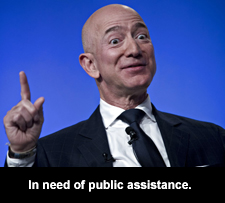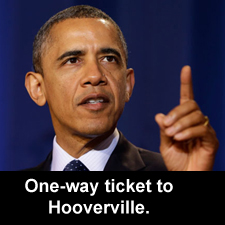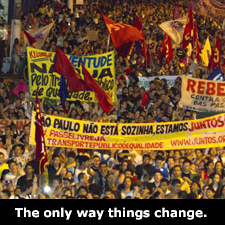At the beginning of this year, Amazon.com founder Jeff Bezos was worth about $100 billion. By May, his fortune had reportedly ballooned to somewhere in the neighborhood of $130 billion. Now it appears to fluctuate between $137 and $160 billion, this last number from CNBC in October. So, it sounds like he won’t be hungry for the holidays. That’s more than can be said about the growing number of structurally unemployed and food-insecure Americans who have fallen through our inadequate and now badly shredded federal safety net.
 This Pharaoh-like magnitude of personal wealth reflects a failing economy – more specifically, an economy that fails to serve a large swath of the population. It is about more than personal wealth. Any dude with $137 billion dollars (and there’s only one, so yes, it’s a dude) possesses $136 billion more than he could ever hope to spend on himself. The accumulation of untold billions is all about power – the power to affect the lives of millions on a whim, whether for good or ill. When Bill Gates sank a billion dollars of his fortune into distorting our educational system (and helping to undermine public sector unions in the process), he didn’t do it because we asked for his intervention. He did it because he wanted to, and because he thought his wealth gave him license. He was right … but only because we as a people have not taken steps to constrain that license.
This Pharaoh-like magnitude of personal wealth reflects a failing economy – more specifically, an economy that fails to serve a large swath of the population. It is about more than personal wealth. Any dude with $137 billion dollars (and there’s only one, so yes, it’s a dude) possesses $136 billion more than he could ever hope to spend on himself. The accumulation of untold billions is all about power – the power to affect the lives of millions on a whim, whether for good or ill. When Bill Gates sank a billion dollars of his fortune into distorting our educational system (and helping to undermine public sector unions in the process), he didn’t do it because we asked for his intervention. He did it because he wanted to, and because he thought his wealth gave him license. He was right … but only because we as a people have not taken steps to constrain that license.
And yet, with all of their wealth and power, the billionaires still ask for public assistance. Worse, they encourage people to jump up and down like children, competing for the rare privilege of giving them more money. The obvious example is Amazon’s HQ2 bidding process, which recently concluded with a split decision between New York City and northern Virginia, outside of DC. The cost to taxpayers in both areas will be at least $4.6 billion in tax subsidies, not counting the substantial incentives laid out through provisions of the recent GOP tax giveaway. (See David Dayen and Rachel Cohen’s piece in The Intercept for details.) Okay, $4.6 billion is lunch money to Jeff Bezos. Instead of asking underserved communities to fork over public resources, why doesn’t he just use a small part of his $136 billion personal surplus to build his dumb-ass second headquarters and pay goddamn taxes like a normal human being?
Why? Because this isn’t about money. It’s about power, and perpetuating the cult of privilege that has been built around oligarchs like Bezos and Gates and the Mercers and the Kochs and Trump. It’s up to us to pull this edifice down before it gets too big to demolish.
luv u,
jp

 someone you could describe as disappointed in the president: he is very much the kind of leader I expected him to be following his 2008 election. Probably the most prescient look at the then-early Obama presidency in 2009 was published in Harper‘s under the title
someone you could describe as disappointed in the president: he is very much the kind of leader I expected him to be following his 2008 election. Probably the most prescient look at the then-early Obama presidency in 2009 was published in Harper‘s under the title  Still, it’s interesting that in both cases, the original impetus for the protest was a decision by the government affecting public services. Both Turkey and Brazil have been touted as relatively successful governments, and yet beneath many success stories there is often another story to tell, that of the poor, the working people, those left behind. You can see them in Brazil, in China, in India, in Turkey, just as you can see them here in the United States. True, the standard of living in Brazil has improved vastly over the last decade. But the people protesting increased transit fares are making us aware of the work that is yet to be done.
Still, it’s interesting that in both cases, the original impetus for the protest was a decision by the government affecting public services. Both Turkey and Brazil have been touted as relatively successful governments, and yet beneath many success stories there is often another story to tell, that of the poor, the working people, those left behind. You can see them in Brazil, in China, in India, in Turkey, just as you can see them here in the United States. True, the standard of living in Brazil has improved vastly over the last decade. But the people protesting increased transit fares are making us aware of the work that is yet to be done.